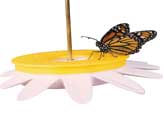|
|
 |
|
|
Study Raises Questions
A note in Nature in May 1999 about a small laboratory feeding trial appeared to show monarch butterfly caterpillars fed milkweed leaves coated with Bt corn pollen grew slower and suffered a higher death rate than caterpillars that consumed milkweed leaves free of corn pollen. Monarch caterpillars only eat a diet of milkweed leaves, and milkweed often grows near and in cornfields.
By design, researchers did not mimic natural conditions. These caterpillars were given no choice but to feed on leaves heavily covered with Bt corn pollen. The actual dose of Bt corn pollen used was not measured.
The lead researcher of the study cautioned that it would be inappropriate to draw any conclusions about the risks to monarchs in the field based solely on these initial results.
Major U.S. print and broadcast outlets picked up on the note without considering the caution. The media presented the idea that monarchs were being killed by pollen from Bt corn planted by farmers.
This misimpression fueled a public outcry as publicity spread. The European Commission reacted by placing a freeze on the approval process for Bt corn, and activists in the United States called for a moratorium on the further planting of Bt corn.
|
|
 |
 |
 |
|
“Many lessons have been learnt from the ‘monarch saga’ not least that it is imperative that conclusions concerning environment or nontarget effects of transgenic crops be based on appropriate methods of investigation and sound risk-assessment procedures.”
— Gatehouse et al., 2002
|
|
|

